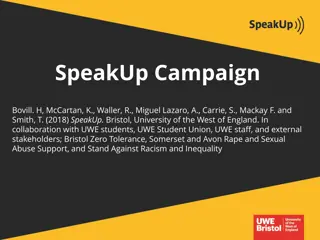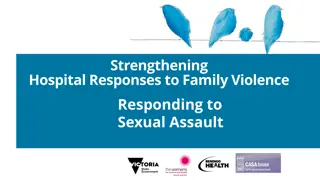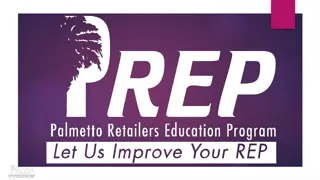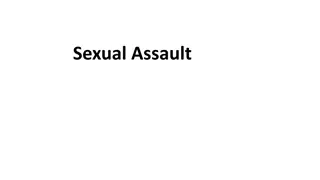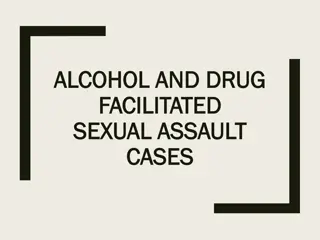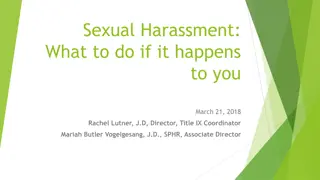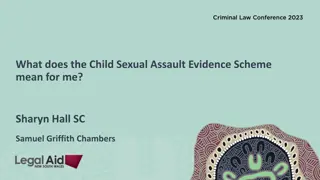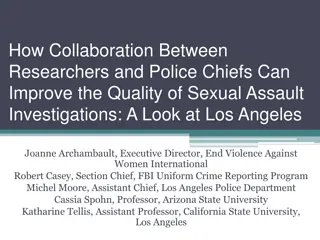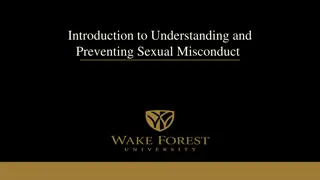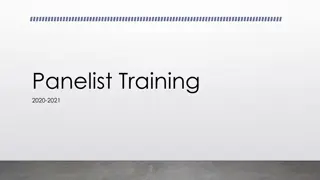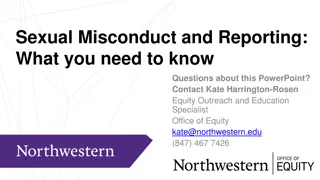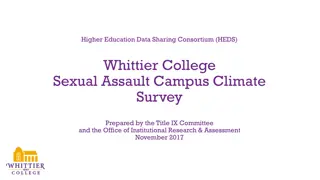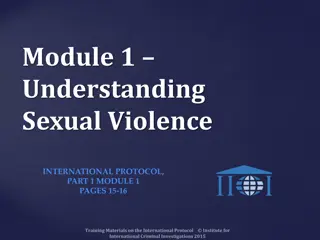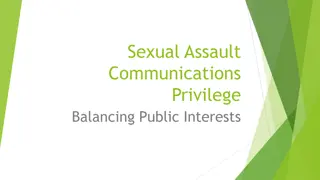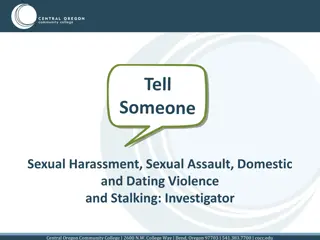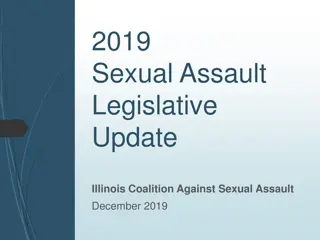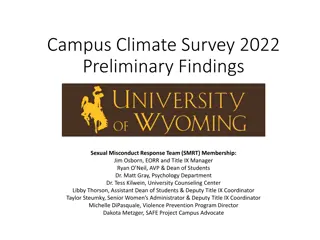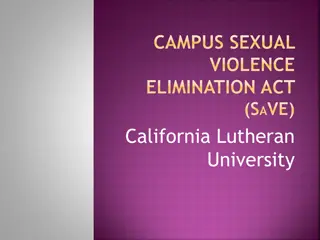Understanding Title IX and Campus Sexual Assault
Title IX is a federal law prohibiting sex-based discrimination in federally funded education programs. The Clery Act mandates disclosure of crime stats on campuses. Statistics reveal alarming rates of sexual assault on college campuses, mainly affecting freshmen and sophomores. Various methods of assault are highlighted, and significant underreporting persists due to various factors. Introducing programs like SCCs can help prevent sexual violence and emphasize the importance of consent.
Download Presentation

Please find below an Image/Link to download the presentation.
The content on the website is provided AS IS for your information and personal use only. It may not be sold, licensed, or shared on other websites without obtaining consent from the author. Download presentation by click this link. If you encounter any issues during the download, it is possible that the publisher has removed the file from their server.
E N D
Presentation Transcript
Welcome to New Student Orientation Title IX
Title IX: A comprehensive federal law that prohibits discrimination on the basis of sex in any federally funded education program or activity. Clery Act A federal law that requires colleges and universities to disclose information regarding crime statistics and security measures in an Annual Security Audit. VAWA Violence Against Women Act, amends Clery Act to include dating violence, domestic violence, sexual assault and stalking as reporting categories. Gender identity and national origin are added as new categories for hate crimes. Requires institutions to offer training and awareness programs.
1 in 4 women are sexually assaulted while in college. Fewer than 5% report the crime. 99% of perpetrators are males. 94% of victims of sexual assault are women. Approximately 6.1% of men reported experiencing attempted or completed sexual assault since entering college.
Nearly 3 out of 4 Victims are freshman or sophomores - generally happens early in the semester. 20% of perpetrators are repeat offenders. And stats show they are on their 6thor 7thassault. 90% of college campus assaults involve victims who know their assailants. 40% of Victims Delay Reporting Average Delay = 11.3 months.
Methods of Sexual Assault: Incapacitation 33% Drugs and Alcohol Physical Force 29% Filed Consent 18% Miscommunication, happens often with women who have been abused Sexual Coercion 13% Drug 7% Facilitated
Significant Underreporting: Shame/Embarrassment/Fear Lack of confidence in the process Unsure of how to report Confused over acceptable standards of conduct Fear of punishment for activities preceding assault Membership in marginalized groups
Top Cited Reasons for Under- reporting: Lack of confidence in the process. Unsure of how to report.
Introduce SCCs Preventing Sexual Violence Brochure CONSENT = A CLEAR YES!
Examples of Sexual Misconduct or possibly Sexual Harassment. A male student tells a female student he finds her attractive and what he'd like to do to her if they were alone. He never touches her, but his comments become more frequent. A female student corners another student and makes a propositions. Whenever possible thereafter, she brushes against the other student, gives hugs, or massages a shoulder. A sexually inappropriate remark here or there won't generally rise to the level of a hostile environment; however, such comments are often a precursor to a viable sex harassment grievance.
Examples of Sexual Misconduct or possibly Sexual Harassment (if it is repeated enough or severe enough in only one instance) Making sexual propositions or pressuring for sexual favors. Unwelcome sexual advances. Displaying sexually explicit drawings, pictures, social media, or written materials. Performing sexual gestures or touching oneself sexually in front of others. Exposure. Telling sexual or dirty jokes.
Introduce SCC Policy 6.03.03 CONSENT = A CLEAR YES!
Confidential Employee is not required to report incidents of sexual misconduct to the College s Title IX Coordinator if confidentiality is requested by the student. Campus counselors are considered Confidential Employees. If a student is unsure of someone s duties and ability to maintain one s privacy, the student should ask the person before he/she speaks to him/her. If the campus is in danger then the safety of the campus overrides the student request for confidentiality. SCC Confidential Employees: Peter Buck, Sarah Altman
Responsible Employee a College employee who has the authority to take action to redress sexual harassment/misconduct; who has been given the duty of reporting incidents of sexual harassment/misconduct or any other misconduct by students to the Title IX coordinator; or who a student reasonably believes has this authority or duty. The College s Responsible Employees include all College administrators (Deans, Directors, Coordinators and Vice Presidents). If a student is unsure of someone s duties and ability to maintain one s privacy, the student should ask the person before he/she speaks to him/her.
Title IX Student Administrator and Filing a Complaint: Cheryl Contino-Conner Dean of Students Balsam Center, Room 116 Cheryl@southwesterncc.edu 828-339-4245 You are encouraged to report all Title IX violations. You can report in person, or use the student concerns portal located on your MySCC link.
Investigating Title IX violations: Investigations will occur in a prompt, fair and equitable manner, as defined by policies: 6.03.03 Discrimination and Unlawful Harassment; 6.03.01 Campus Security Reporting, Clery Act. Appropriate accommodations will be provided during the investigation.
The Investigation decision is decided using a preponderance of evidence standard, i.e., it s more likely than not that the sexual harassment or violence occurred. 51% rule Much different from court decisions: Preponderance of Evidence Clear and Convincing Beyond a Reasonable Doubt
Complainant Rights: Case presentation Notification of investigation time frame Decision = Preponderance of Evidence Notified in writing of outcome, including sanction as it relates to the complainant.
Staying SAFE on Campus: Walk with purpose! If you work/study in an isolated area, tell someone! Your safety can be compromised in isolated spaces. Make it tough for someone to take you by surprise don t wear ear buds. Parking lots = Hold off on phone calls. Have your car key in hand, ready to put in the lock as you are walking to your car. Check the backseat before entering. Keep your car locked, always.
Staying SAFE, in general: A large % of victims know their attackers. So, Clearly communicate your intentions say NO and mean it. Alcohol and other drugs compromise your safety by lowering inhibitions and clouding judgment. If you go somewhere with friends, make sure everyone is accounted for before leaving. Don t be alone with someone you just met. Be aware of date rape drugs. Trust your instincts.
Safe and Positive Options for Bystanders/Witnesses and Friends There are usually bystanders who inadvertently support sexual harassment/sexual violence. They do so by not intervening when they see inappropriate interactions. By not intervening, they are condoning the behavior.
Proactive Bystander Strategies: Believe violence is unacceptable and say so. Treat all people with respect. Say something when someone blames the victim. Encourage friends to trust their instincts. Do not laugh at sexist or racist jokes. Look out for friends at parties, at school, in student areas. Empower victims to tell their stories. Assist friends (in a safe manner) when harms way is questionable.
SCC promotes a safe learning environment. Student Concerns Portal: Southwesterncc.edu mySCC; students/sexual harassment & Title IX; consumer information We operate with a ZERO tolerance for bullying, discrimination, hate crimes, hate language and sexual dating/domestic violence.
Visit SCCs Title IX webpage: From SCC s homepage, click on: Students Sexual Harassment and Title IX https://www.southwesterncc.edu/sexual- harassment-and-title-ix

 undefined
undefined




